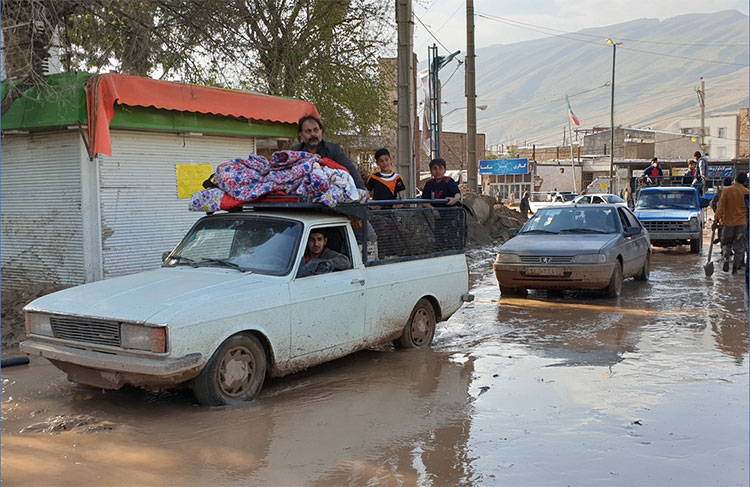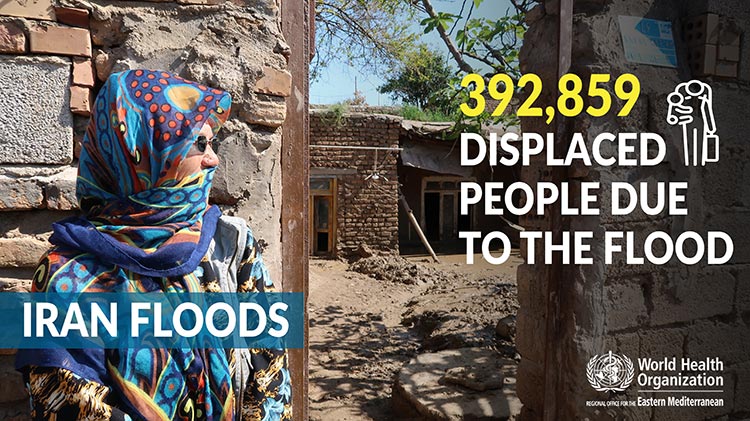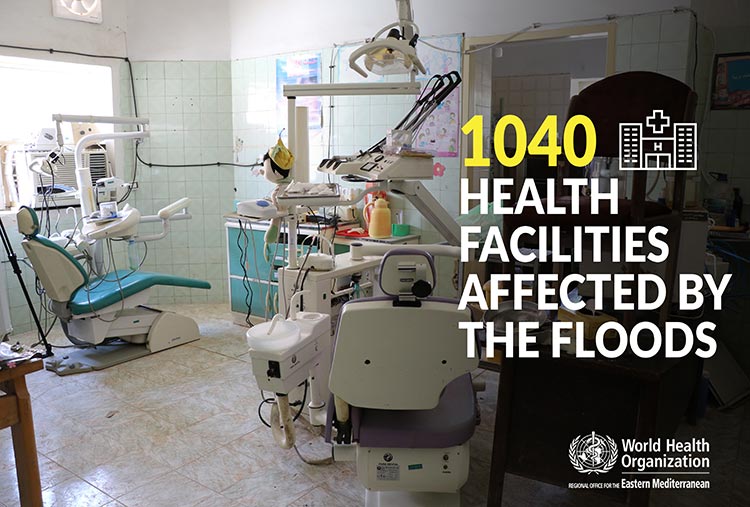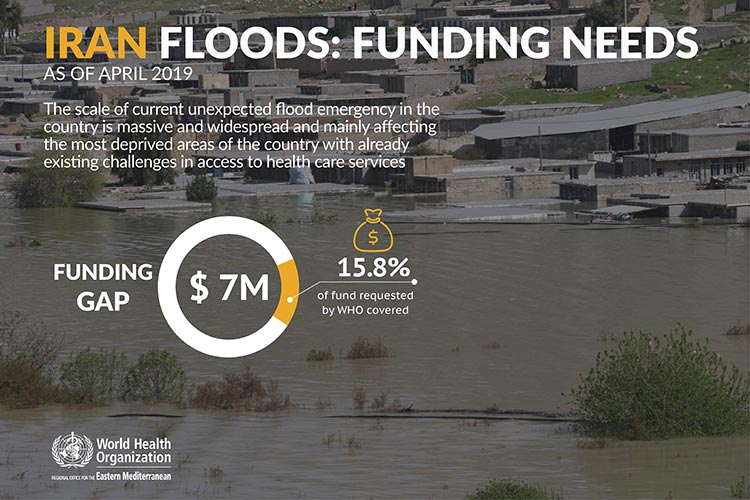Outbreak update - Cholera in Yemen, 18 August 2019
29 August 2019 - The Ministry of Public Health and Population of Yemen reported 16,296 suspected cases and 8 associated deaths during epidemiological week 33 (12- 18 August) of 2019. Thirteen percent of cases were severe. The cumulative total number of suspected cholera cases from 1 January 2018 to 18 August 2019 is 953 888, with 1323 associated deaths (CFR 0.14%). Children under five represent 24.4% of total suspected cases during 2019. The outbreak has affected 22 of 23 governorates and 305 of 333 districts in Yemen.
The trend of weekly reported suspected cholera cases started increasing from week 8 in 2019 and reached more than 29 500 cases in week 14. These were the maximum number of cases reported so far. The trend of suspected cases has been fluctuating over the past weeks. Starting from week 23, the number of cases increased with the start of rainy season. However, since week 27, less cases were reported every week. For the last three weeks, a stable trend was observed.
The governorates reporting the highest number of suspected cases of cholera during 2019 were Amanat Al Asimah (83 870), Al Hudaydah (74 547) Sana’a (72 160), Hajjah (55 272), Dhamar (50 016), Ibb (52 611), and Arman (38 916).
Of a total 88 173 samples tested since January 2019, 4352 have been confirmed as cholera-positive by culture at the central public health laboratories. During this reporting period the governorates reporting the highest number of positive culture were Taizz (1106), Amanat Al Asimah (1236) and Sana’a (436).
WHO continues to provide leadership and support for activities with health authorities and partners to respond to this ongoing cholera outbreak, including case management, surveillance and laboratory investigations, hotspot mapping and Oral Cholera Vaccine (OCV) campaign planning, water sanitation, hygiene (WaSH) and risk communication.
Outbreak update - Cholera in Somalia, 01 August 2019
01 August 2019 – The Ministry of Health of Somalia has announced 48 new suspected cases of cholera, with no deaths, for epidemiological week 30 (22th-28th July) in 2019. The cumulative total number of suspected cholera cases since the beginning of this outbreak in December 2017 is 8454, including 46 associated death cases. During this reporting period, all of the cases were reported from a total of 17 districts in Banadir region. Of the 48 cases reported during week 30, 60% of the cases (29) are children below 5 years of age.
The cholera outbreak has been contained in the districts of Jubaland, Hirshabelle and South West States following implementation of oral cholera vaccination (OCV) campaigns and other health interventions in these areas. Active transmission is still reported in Banadir region. Over the past two weeks there has been a reduction in the number of cholera cases reported from 65 in week 29 to 48 in week 30 in Banadir region. The most affected districts in Banadir are Dharkenley,Daynile,Hamarjajab, Hawlwadag and Hodan. The overall reduction in number of new cholera cases is attributed to improved implementation of preventive interventions including OCV and strengthening WaSH activities in hot spots.
Of the 765 stool samples tested since December 2017, a total of 152 samples were tested positive for Vibrio cholera serotype.
During week 24 and 26 WHO and MOH implemented Oral cholera vaccination campaign in 6 cholera high risk districts of Kahda, Hamajajab and Heliwa in Banadir region, Kismayo, Balad and Afgoi. A total of 621,875 (96.7%) of people aged 1 year and above received the first dose of cholera vaccine.
WHO continues to provide leadership and support the health authorities and partners in activities to mitigate the outbreak. The disease surveillance system is managed by the Electronic Early Warning Alert and Response Network (EWARN) system with the support of WHO and is currently being expanded to all health facilities across the country. WHO and the Ministry of Health continue to monitor outbreak trends through the EWARN system and promptly investigate and respond to all alerts.
Iran floods leave people with limited access to life-saving health services

On 18 March 2019, a flood hit the eastern part of Mazandaran and Golestan provinces after four days of heavy rain. A few days later, additional floods in the west, southwest, and northeast of the country affected thousands of people. Shortly after, a third wave of heavy rains commenced.
As of 9 April, a total of 28 provinces have been affected by the floods (out of 31 provinces in total).
Overall, a total of 42 269 129 people have been affected by the floods across, almost 392,859 people have been displaced, 84 have died, and around 20,573 persons were injured.

The total estimated population in need of immediate health care assistance is around 3,000,000 people.
People in need for health care assistance
People internally displaced due to the flood
Children affected in the most vulnerable areas
Health facilities damaged in the most affected areas
Provinces affected by the floods (out of 31 provinces)
Deaths (84) and injuries (20573) due to the floods
The floods have fully and partially destroyed 1040 health facilities and 81 hospitals, leaving patients with limited access to essential and life-saving health services.
In some provinces, health facilities are not functional due to inaccessibility due to road blocks, running water, and landslides as well as due to standing water in buildings.

Health workers are not able to reach populations in need, as transportation and infrastructure has been destroyed.
Dr Christoph Hamelmann - WHO Representative for the Islamic Republic of Iran

Related link
Outbreak update – Cholera in Somalia, 14 April
7 April 2019 – The Ministry of Health of Somalia has announced 30 new suspected cases of cholera, with no deaths, for epidemiological week 15 (8 to 14 April) in 2019. The cumulative total number of suspected cholera cases since the beginning of this outbreak in December 2017 is 7063, including 46 associated death cases.
Of the 30 cases reported during week 14, 57% are children below 5 years of age, and none received Oral Cholera Vaccine (OCV) in 2018/19 campaigns. Internally Displaced People in Banadir are the most affected, due to limited access to safe water and sanitation in their surroundings.
The cholera outbreak has been contained in the districts of Jubaland, Hirshabelle and South West States following implementation of control and preventive measures in these areas, including OCV campaigns.
Since the beginning of 2019, 9 of 103 stool samples collected and tested in the National Public Heatlh Laboratory in Mogadishu came back positive for V. Cholerae, serotype O1 Ogawa by culture.
WHO continues to provide leadership and support to the health authorities and partners to scale up the activities to mitigate the impact of the cholera outbreak. The disease surveillance system is managed through the Electronic Early Warning Alert and Response Network (EWARN) system with the support of WHO and is currently being expanded to all health facilities across the country. WHO and the Ministry of Health continue to monitor outbreak trends through the EWARN system and promptly investigate and respond to all alerts. The Ministry of Health is planning to implement OCV campaigns in ten districts within Mogadishu and surrounding areas.








